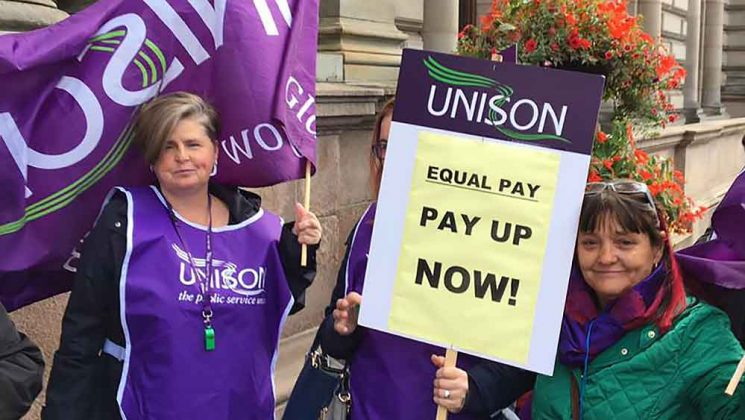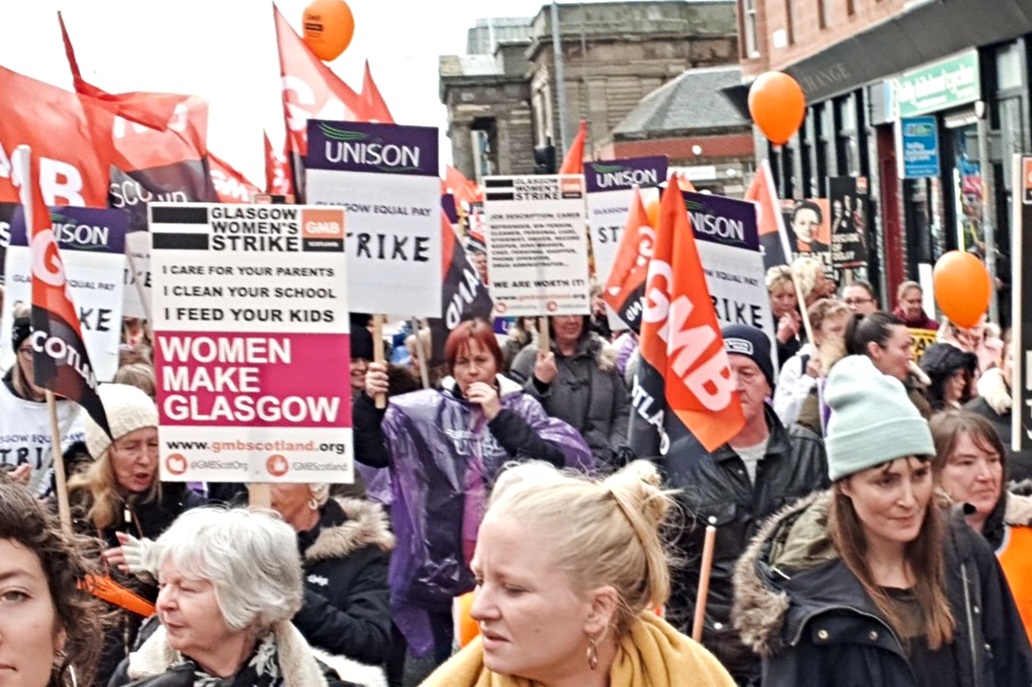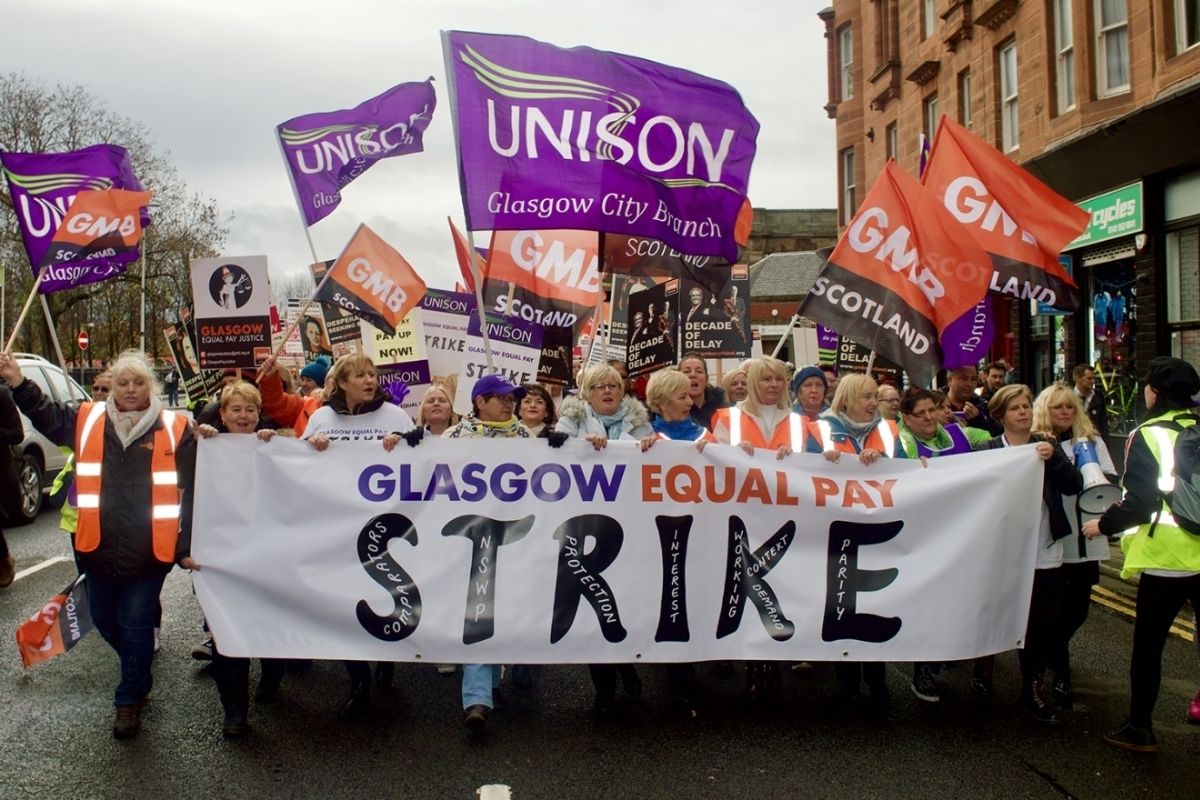Local government workers across Scotland are mobilising in a struggle over pay – part of a wider strikewave that is sweeping across Britain. To win, the trade unions must organise coordinated action, and fight for a bold socialist alternative.
Strike action is set to go ahead in Scottish local councils, following a unanimous rejection by union members of local government association COSLA’s derisive pay offer, which remains far below-inflation.
Consequently, the cost-of-living crisis facing low-paid council workers has now been branded the ‘COSLA living crisis’.
Insulting offer
This latest decision to take industrial action reflects the demands of nearly 25,000 council workers in Scotland, represented by Unison, Unite, and GMB, who have voted in the largest council strike ballot in more than a decade.
 The result comes on the back of other recent struggles across local authorities in Scotland. This includes the wave of strikes seen in Glasgow during COP26 last autumn, and a dispute over unequal pay involving council workers in the same city.
The result comes on the back of other recent struggles across local authorities in Scotland. This includes the wave of strikes seen in Glasgow during COP26 last autumn, and a dispute over unequal pay involving council workers in the same city.
After initially proposing a pathetic 2% pay rise, COSLA (the Convention of Scottish Local Authorities) was forced to revise this figure upwards to 5%.
But all these offers have been rebuffed by the unions, with Unison’s head of local government, Johanna Baxter, labelling them “derisory” and “insulting” to council workers.
COSLA’s latest pay offer comes at a time when official UK inflation has surpassed 10%, and is predicted to easily exceed 13% by the end of the year.
Even the 5% offer now on the table is therefore a massive real-terms pay cut, in a sector that is already compensated poorly. More than half of Scottish council workers earn less than £25,000 annually for a 37-hour week.
What Scottish council workers are being asked to accept is also below the £1,925 flat payment offered to workers across local governments in England, Wales, and the North of Ireland – itself considerably below the predicted rise in inflation.
Instead, Unison, Unite, and GMB have submitted a joint pay claim to local government body COSLA. Amongst other demands about working conditions, the unions have demanded a £3,000 pay rise at all pay grades, and a minimum £12 per hour wage for all council staff.
Passing the buck
 Last month, in an attempt to win their demands and prevent strike action, the unions proposed a summit with Scottish First Minister Nicola Sturgeon and Holyrood Finance Minister Kate Forbes.
Last month, in an attempt to win their demands and prevent strike action, the unions proposed a summit with Scottish First Minister Nicola Sturgeon and Holyrood Finance Minister Kate Forbes.
This meeting was refused, however. According to Forbes, it would not have been “appropriate [for the Scottish government] to interfere” in the negotiations between COSLA and the council workers.
But this view is not even shared by COSLA representatives, who have asked the Scottish government for more money to fund pay rises for council workers.
This impasse between COSLA and the Scottish government is nothing but a pathetic argument over who wields the axe. No wonder workers are moving to fight back, when faced with such a farce.
Workers everywhere are already facing a desperate situation, with soaring prices for energy and food. They cannot afford to sit and wait whilst different wings of the establishment attempt to pass the buck when it comes to cuts and austerity.
Ultimately, neither COSLA nor the Scottish government can be trusted to deliver a fair deal to workers. Instead, workers must rely on their own strength and solidarity – uniting and fighting to win a proper pay rise.
Action begins
Taking matters into their own hands, bin workers in Edinburgh have already commenced strike action. This will continue until the end of the month, causing mayhem at the city’s Fringe Festival.
And a further round of waste service strikes will start tomorrow, on 24 August, affecting 14 councils across Scotland.
#Edinburgh ? Bin Poverty Wages! Victory To The Striking Workers! ? pic.twitter.com/ao0VwNClu1
— Murphy (@MJ_Murphy89) August 22, 2022
The vital importance of these workers is made plain for all to see when they withdraw their labour, with rubbish already piling up on the streets of the Scottish capital.
In addition, Unison has served notice that school and nursery strikes will take place on 6-8 September in nine Scottish local authorities, bringing the total number of striking Unison members to 13,000.
This is all taking place alongside a move to strike ballots for Unite and GMB members in local government in the rest of Britain, with these unions outright rejecting the employers’ below-inflation £1,925 offer to council workers.
This shows the way forward in the fight for decent pay. The path to victory lies through militant and united action.
BREAKING ?: GMB to ballot over 100,000 local government workers over pay ✊
— GMB Union (@GMB_union) August 22, 2022
United fightback
 Across Britain, workers are mobilising and fighting back. From the railways and the postal service, to the bus drivers and barristers – class struggle is on the agenda everywhere.
Across Britain, workers are mobilising and fighting back. From the railways and the postal service, to the bus drivers and barristers – class struggle is on the agenda everywhere.
The next step is for the trade unions to coordinate action, in Scottish councils and across the country, looking towards a nationwide public sector strike, as part of a mass campaign against austerity and inflation.
Such a campaign must offer a shield and a sword: opposing the general onslaught against workers’ wages by the employers and their political representatives, through united strike action; and offering a bold socialist programme, involving the expropriation of the billionaires to fund decent pay and public services for all.
As RMT leader Mick Lynch stated recently, quoting Marxist Ted Grant: “Not a wheel turns, not a phone rings, not a lightbulb shines, without the kind permission of the working class.”
“You have the power. A wheel doesn’t turn. A light doesn’t go on without us.”
Speaking at the @RMTunion rally at King’s Cross, Mick Lynch calls on workers of the UK to unite and demand better conditions for all pic.twitter.com/pS2kqm7Q0B
— PoliticsJOE (@PoliticsJOE_UK) June 25, 2022
It’s high time the trade union movement proved this in action.
At root, the crisis in local government is a product of the crisis of capitalism. And whether through austerity or inflation, workers are being asked to foot the bill.
By drawing a line in the sand and striking back, local government workers in Scotland and elsewhere are setting an example to the rest of our class – taking an important step forward in the struggle to end this crisis once and for all.






